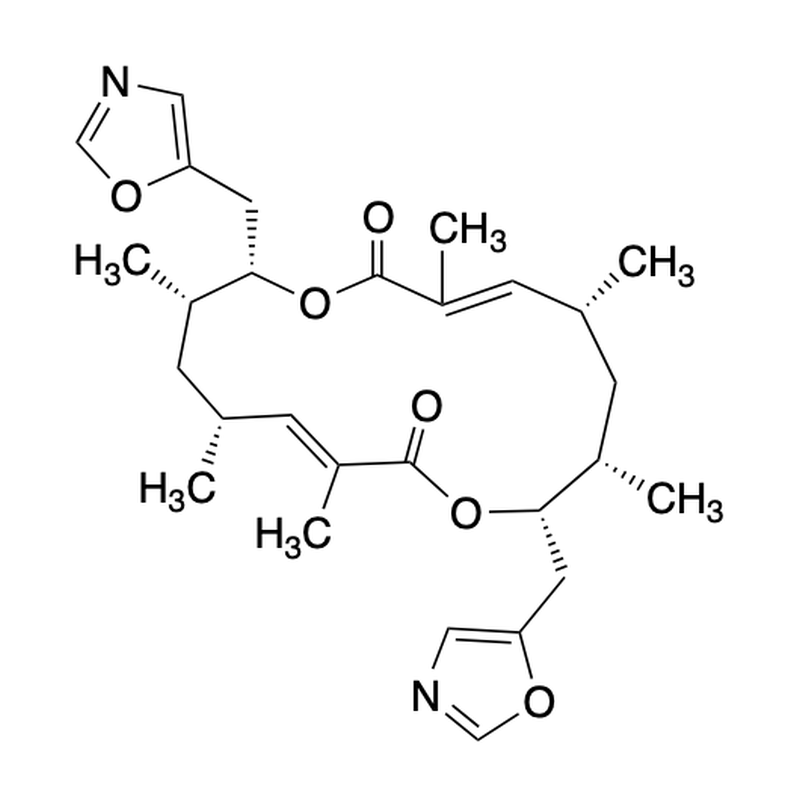产品
编 号:F437753
分子式:C28H38N2O6
分子量:498.61
分子式:C28H38N2O6
分子量:498.61
产品类型
规格
价格
是否有货
结构图

CAS No: 72263-05-9
产品详情
生物活性:
Conglobatin (FW-04-806), a macrolide dilactone, is isolated from the culture of Streptomyces conglobatus. Conglobatin is an orally active Hsp90 inhibitor. Conglobatin can bind to the N-terminal domain of Hsp90 and disrupt Hsp90-Cdc37 complex formation. Conglobatin induces apoptosis in human breast cancer cells and esophageal squamous cell carcinoma cells, and exhibits antitumor activity in vivo.
体内研究:
Conglobatin (50-200 mg/kg; i.g. q3d for 24 d) inhibits the tumor growth of SKBR3 and MCF-7 human breast cancer xenograft models in a dose-dependent manner.Conglobatin (4-8 mg/kg; i.p. daily for 21 days) inhibits tumor growth in EC109 and KYSE510 tumor xenograft models with low toxicityAnimal Model:BALB/c (nu/nu) athymic mice with SKBR3 and MCF-7 tumor xenograft
Dosage:50, 100, 200 mg/kg
Administration:Oral gavage every 3 days for 24 days
Result:Showed inhibition of tumor growth at a rate of 39.1%, 52.7%, and 67.5% in the SKBR3 cell line groups and 27.3%, 39.8%, 54.3% in the MCF-7 cell line groups at the three increasing doses, respectively.Was well tolerated.
体外研究:
Conglobatin (6.25-100 μM; 48 h) markedly inhibits the proliferation of SKBR3 and MCF-7 cells, with IC50s of 12.11 and 39.44 μM, respectively.Conglobatin inhibits cell proliferation in EC109, KYSE70, KYSE450, KYSE150, KYSE180, and KYSE510 cells, with IC50s of 16.43, 15.89, 10.94, 10.50, 10.28, and 9.31 μM, respectively.Conglobatin (10-40 μM; 24 h) displays obvious arrest of SKBR3 and MCF-7 cells in the G2/M phase. Conglobatin induces apoptosis through caspase-dependent pathways in SKBR3 and MCF-7 cells.Conglobatin (10-40 μM; 3-24 h) reduces Hsp90 client protein levels and induces proteasome-dependent degradation.Conglobatin binds to the N-terminal of Hsp90, does not affect ATP-binding capability of Hsp90, but inhibits Hsp90/Cdc37 chaperone/co-chaperone interactions.
Conglobatin (FW-04-806), a macrolide dilactone, is isolated from the culture of Streptomyces conglobatus. Conglobatin is an orally active Hsp90 inhibitor. Conglobatin can bind to the N-terminal domain of Hsp90 and disrupt Hsp90-Cdc37 complex formation. Conglobatin induces apoptosis in human breast cancer cells and esophageal squamous cell carcinoma cells, and exhibits antitumor activity in vivo.
体内研究:
Conglobatin (50-200 mg/kg; i.g. q3d for 24 d) inhibits the tumor growth of SKBR3 and MCF-7 human breast cancer xenograft models in a dose-dependent manner.Conglobatin (4-8 mg/kg; i.p. daily for 21 days) inhibits tumor growth in EC109 and KYSE510 tumor xenograft models with low toxicityAnimal Model:BALB/c (nu/nu) athymic mice with SKBR3 and MCF-7 tumor xenograft
Dosage:50, 100, 200 mg/kg
Administration:Oral gavage every 3 days for 24 days
Result:Showed inhibition of tumor growth at a rate of 39.1%, 52.7%, and 67.5% in the SKBR3 cell line groups and 27.3%, 39.8%, 54.3% in the MCF-7 cell line groups at the three increasing doses, respectively.Was well tolerated.
体外研究:
Conglobatin (6.25-100 μM; 48 h) markedly inhibits the proliferation of SKBR3 and MCF-7 cells, with IC50s of 12.11 and 39.44 μM, respectively.Conglobatin inhibits cell proliferation in EC109, KYSE70, KYSE450, KYSE150, KYSE180, and KYSE510 cells, with IC50s of 16.43, 15.89, 10.94, 10.50, 10.28, and 9.31 μM, respectively.Conglobatin (10-40 μM; 24 h) displays obvious arrest of SKBR3 and MCF-7 cells in the G2/M phase. Conglobatin induces apoptosis through caspase-dependent pathways in SKBR3 and MCF-7 cells.Conglobatin (10-40 μM; 3-24 h) reduces Hsp90 client protein levels and induces proteasome-dependent degradation.Conglobatin binds to the N-terminal of Hsp90, does not affect ATP-binding capability of Hsp90, but inhibits Hsp90/Cdc37 chaperone/co-chaperone interactions.
产品资料

